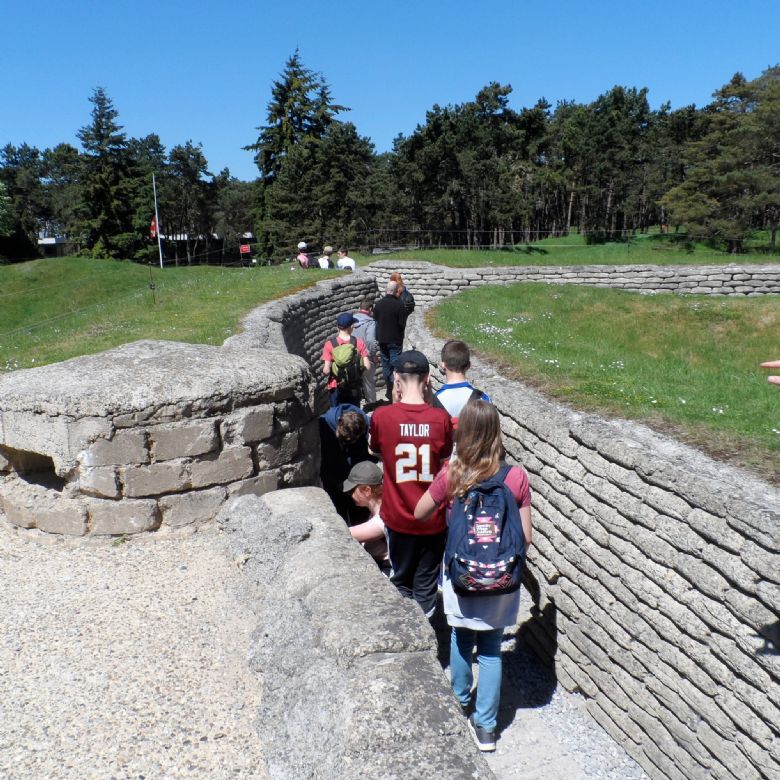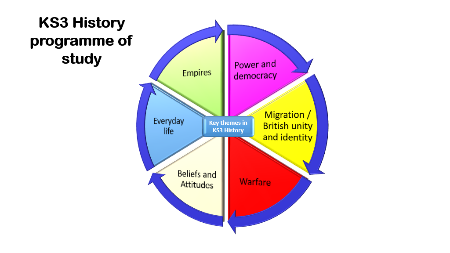History & Politics
FACULTY LEADER: Mrs N Edney
SUBJECT LEADER: Mr P Low

KS3 Curriculum
The History curriculum at Key Stage 3 is focussed around the development of six key themes that follow a chronological path through Britain’s domestic and international history. Where appropriate the curriculum will make comparisons and links to international developments and events in history. Our programme of study has been designed to work with, and build on, the historical learning students will have started at Key Stage 1 & 2. For example, many students will study the Romans at Key Stage 2 and we build on this prior learning to help students understand the nature of Empire in Year 7. Students will study one unit of each theme in an academic year. As students progress through Key Stage 3 they will develop an understanding of how these themes have developed through time. The second order concepts specified in the Key Stage 3 National Curriculum, such as change and continuity, cause and consequences, interpretations, source analysis, difference and significance; have been inter-woven into the schemes of work.
 The units studied at Key Stage 3 are focussed around the development of key questions which help to focus student learning throughout the course. Assessment for, as, and of learning has been integrated into our Schemes of Work and students will regularly experience low stake quizzing, knowledge test and at least one piece of written feedback per half-term. Student feedback is considered to be very important in the department, and we use Student Voice feedback to update and adapt our lessons and schemes accordingly.
The units studied at Key Stage 3 are focussed around the development of key questions which help to focus student learning throughout the course. Assessment for, as, and of learning has been integrated into our Schemes of Work and students will regularly experience low stake quizzing, knowledge test and at least one piece of written feedback per half-term. Student feedback is considered to be very important in the department, and we use Student Voice feedback to update and adapt our lessons and schemes accordingly.
| Term One | Term Two | Term Three | |
|---|---|---|---|
| Year 7 | |||
| Year 8 | |||
| Year 9 |
The student experience in History is very important to the department and we work hard to make it as good as possible. This has included making effectively use the different technology on offer at Prince Henry’s, such as iPads and Microsoft Teams.
KS4 Curriculum
At Key Stage 4, students may opt to study GCSE History (Edexcel).
In Year 10 we study: Medicine through time; The British Sector of the Western Front; Early Elizabethan England 1558-88.
In Year 11 we study: Weimar and Nazi Germany 1918-1939; Superpower relations and the Cold War.
KS5 Curriculum
At Key Stage 5, students at Prince Henry’s study the AQA A-level History specification. Lessons are taught over nine periods a fortnight, and you will have a specialist teacher for unit 1 and 2. The NEA will be taught in the summer term of Year 12 and will be delivered by both teachers. The two-year nature of the course means that we aim to keep you with the same teachers for the duration of the course. An overview of the topics can be seen below:
|
Unit |
Key Focus |
Exam Information |
|---|---|---|
|
1H Tsarist and Communist Russia, 1855–1964 |
Changes and developments in governance and authority Opposition and resistance Economic, social, and cultural developments Political ideas and ideology Role of individuals and groups. |
2-hour exam
|
|
2S The Making of Modern Britain, 1951–2007 |
Economic, social, political and international changes that helped to shape and model the country today. Ideas and concepts about government, class, social divisions and cultural changes are explored in detail. |
2-hour exam
|
| 3 Non-Examined Assessment |
A 4500 words, independent research project. Students are encouraged to choose a question that focusses on changes and continuities within the British Empire over a 100 year time-frame. At present most students focus on the causes of the Indian Mutiny / First War of Indian Independence in 1857. |
4500 words essay that is internally marked and is moderated by the exam board. |
The department has an excellent record of academic achievement, and many of our students have progressed to study History and other History related degrees at Oxford, Cambridge and other Russell Group universities across the country.
Assessment
Assessment in History has been designed to support Assessment of, for, and as learning. At KS3 to support students to retain both finger-tip and residual substantive knowledge they are given regular low-stakes knowledge quizzes at the beginning of lessons and at the end of each unit. To assess student retention of residual knowledge there are two summative knowledge tests in each year. To support students to develop their disciplinary knowledge each year group completes three low-stakes formative assessments providing students with feedback on their source analysis, interpretation analysis and historical writing. To assess both substantive and disciplinary knowledge students complete two enquiry-based summative assessments and a summative end of year exam. At KS4 appropriate examination questions are integrated into the SoW to support the development of examination skills. This is supported by regular low-stakes questioning using 5 questions and Educake quizzes. Assessment skills are modelled for students and opportunities for peer assessment have been integrated into the SoW. Year 10 students and future GCSE students will now have two books one for class-work and one for assessments. At KS5 assessment skills and examination style questions have been integrated into the SoW to support students towards their examinations. Regular low-stakes questioning takes place at the beginning of lessons. At all Key Stages students are expected to undertake green pen DIRT tasks to ensure they reflect on feedback and apply guidance from staff.
Enrichment
The History team organises a wide range of enrichment activities to give students opportunities to experience history in both a local and a global context. Regular activities include an annual Year 9 trip to the First World War Battlefields of Belgium and France, and a Year 12/13 History and Politics trip to London and Paris.
